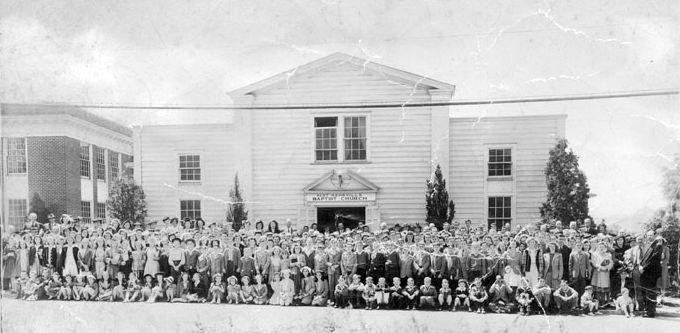In 1938, The Asheville Citizen began running a weekly Monday column called “Excerpts From Sermons Preached Here Sunday.” In it, the paper highlighted homilies from across the city’s churches. The paper appears to have ended the column in May 1942, five months after the U.S. entered World War II.
Below are passages from various sermons included in the column’s four-year run.
On Aug. 20, 1939, the Rev. Nane Starnes of West Asheville Baptist Church delivered his sermon “Building a City.” Starnes praised the area’s natural beauty, noting its appeal to many of the city’s annual visitors. But as Asheville’s popularity continued to grow, Starnes asked his parishioners to consider what types of guests they should encourage and welcome in the future? He declared:
“Some say, become a ‘gay Paree,’ give people what they want, have no distinct character of your own, your purpose is to make money — do anything for a price. But this is home to us and we must keep it a fit place in which to live. If we must choose between money and character, then character must be the choice. It is also true, however, that the character of the people determines the character of the people who are attracted by it. Good people tour as well as bad and they had rather go to a good town with good hotels, good police and few dives and dens than to a rowdy city that has everything. Our reputation will determine the people who will want to come.”
The following year, on April 28, 1940, the Rev. C.M. Jones spoke at the Oakland Heights Presbyterian Church. His sermon “Honoring the Truth” addressed the essential need for honesty in our everyday life, asserting:
“People were made to tell the truth as much as we sometimes doubt it. A lie detector is adequate proof for courts concerning truth because it has been found that one’s blood pressure rises when a falsehood is told and the meter of the lie detector records the rise. If it were not that people were naturally made to tell the truth there would be no such rise in blood pressure. Since it is true that people were naturally made to tell the truth there are a great number of people who live abnormal lives. Severely as we condemn other crimes, the truth is trifled with to such an extent that it is likely to pull down one of the strongest morals of our country — the confidence in each other.”
The final excerpt is from the Rev. Howard Kester’s March 2, 1941, sermon, “The Holy Earth,” delivered at the now-defunct Asheville College. Throughout his homily, Kester bemoaned “man’s wanton misuse of the soil of the earth,” noting “eroded hillsides, bleached and bleeding; … swirling dust storms blotting out the face of the sun; the Mississippi, turbulent, tossing, roaring death and destruction through the middle of a continent and … a thousand mountain streams whose crystal waters are dyed crimson with the earth’s red blood[.]”
This ruin, Kester continued, was emblematic of man’s lost relationship to God. He insisted a reconciliation was imperative, declaring:
“We have partaken of the bounties of the earth, drawing from it the very substances of continuous life but rarely with any regard to our primary and essential relationship to it as an integral part of a spiritual universe without whose goodness human life could not endure.”
Editor’s note: Peculiarities of spelling and punctuation are preserved from the original documents.




Before you comment
The comments section is here to provide a platform for civil dialogue on the issues we face together as a local community. Xpress is committed to offering this platform for all voices, but when the tone of the discussion gets nasty or strays off topic, we believe many people choose not to participate. Xpress editors are determined to moderate comments to ensure a constructive interchange is maintained. All comments judged not to be in keeping with the spirit of civil discourse will be removed and repeat violators will be banned. See here for our terms of service. Thank you for being part of this effort to promote respectful discussion.